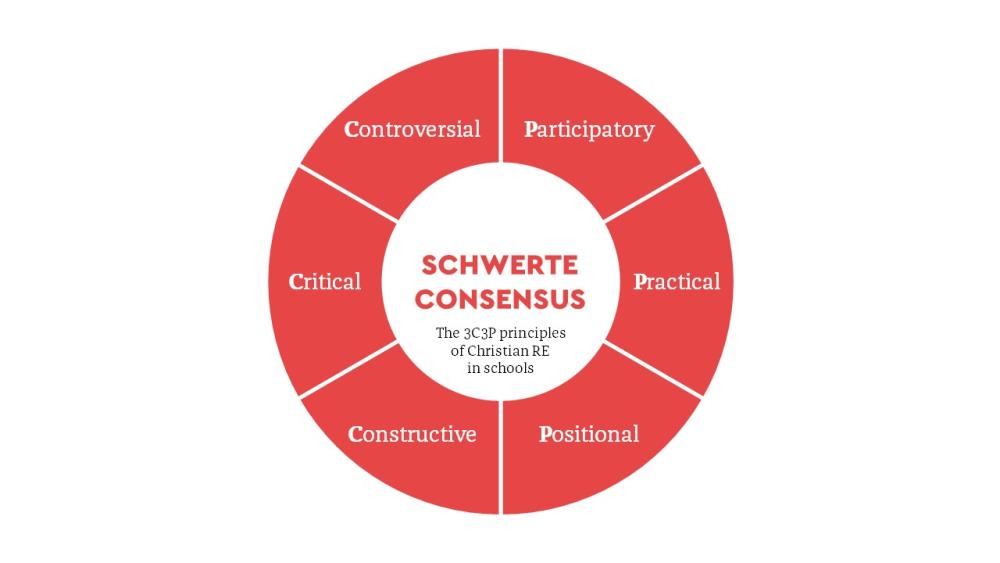Tagungshaus
Schwerte Consensus
The 3C3P principles of Christian RE in schools
Translation by Johanna Hanke, with support from Martin Breul, Jan-Hendrik Herbst and Henrike Herdramm. Original text in Katechetische Blätter 149/2024 (1), 69-71. Also published in: Religión y Escuela 379/2024, S. 14.
The “Schwerte Consensus” summarizes the discussions and results of the symposium “New bottle, old wine? – A New Perspective on Political Issues in RE”, which took place in March 2022 at the Catholic Academy in Schwerte. It was organized by the Institute of Catholic Theology of the Technical University of Dortmund and the Kommende Dortmund, an Institute for the Social Doctrine of the Catholic Church. The consensus was inspired especially by the resolution of the Würzburg Synod about RE in schools (1974) (cf. Könemann & Sajak 2019). This resolution was also intensively received in other countries, for example in Italy, Spain, Belgium, Croatia, Lithuania and Slovakia (Pajer 2012, 40).
The “Schwerte Consensus” is composed of six principles (3c3p) that consider the political dimension of religion and RE. In this context it is also inspired by the famous “Beutelsbach Consensus” (1976) on political and civic education in Germany. The Consensus has already been taken up by some RE teachers in their teaching practice in Germany. A further contextualization as well as a discussion of the text can be found in the following book: Jan-Hendrik Herbst/Claudia Gärtner/Robert Kläsener (eds.), “Der Beutelsbacher Konsens in der religiösen Bildung. Exemplarische Konkretionen und notwendige Transformationen“ [The Beutelsbach Consensus in RE. Exemplary concretions and necessary transformations], Frankfurt am Main: Wochenschau 2023.
Controversial
Issues on which there are differing positions in theology, the church and society should be discussed controversially in RE. The prerequisite for this is that the positions do not contradict human rights or scientific knowledge that has been gained on the basis of common standards of rationality, methodology and argumentation. Controversies ad intra (i.e., the intra- and interreligious variety of religious traditions) as well as controversies ad extra (between religious and secular worldviews) should be considered.
Critical
When initiating and implementing processes of RE, one should (self-)critically reflect on power relations and social ideologies to recognize and counteract social dependencies and inequalities. This also results in the need to articulate critique, opposition and protest against existing religious, social, mental and nature-related power relations and their entanglements.
Constructive
RE should awaken the enthusiasm of students by introducing a perspective of hope into the educational process: It should make accessible the proclamation of the Kingdom of God as a counterfactual interpretation of reality and question its plausibility. Anticipatory and reminiscent at the same time, the orientation towards biblical concepts of justice opens visionary prospects for a future “against all hope”.
Positional
Within RE, it is necessary to take certain (reflected) positions, as RE should be conceived, in line with the biblical tradition, as an advocate for the marginalized. Teachers should make their own position transparent and, at the same time, offer students spaces for free and critical reflection so that they can consciously relate to this position. This basic constellation makes it possible to counteract personal, structural, institutional and existential indoctrination.
Participatory
The personal backgrounds, resources and perspectives of the students must be fully acknowledged in RE. It is essential to encourage students to participate in the learning process. They must learn to intervene in practice according to their own religious convictions or secular worldview. At the same time, they are confronted with the fact that, from a Christian perspective, one’s own practice should be oriented towards the ideas of “peace”, “justice” and “responsibility for creation”.
Practical
RE must be practice-oriented because religions themselves are practical. In addition to addressing religious perceptions and interpretations of the world, as well as their critical evaluation, it is about enabling forms of lived religion. Only by engaging with spiritual practice and (religiously motivated) socio-political actions, RE can open avenues for changing society through individual and collective action and for shaping it in a just way.
You can download the Schwerte Consensus here
Bibliography
Gärtner, Claudia/ Herbst, Jan-Hendrik/ Kläsener, Robert (Eds.). Der Beutelsbacher Konsens in der Religionspädagogik. Exemplarische Konkretionen und notwendige Transformationen. Frankfurt am Main: Wochenschau, 2023.
Könemann, Judith/ Sajak, Clauß Peter. Catholic Religious Education in Germany. The Sustainability of Formal and Non-Formal Learning. In: Schweitzer, Friedrich et al. (Eds.). Researching Non-Formal Religious Education in Europe. Münster: Waxmann, 2019, pp. 35-50.
Pajer, Flavio. Escuela y Religión en Europa. Un camino de cincuenta años [1960-2010] (= Cuadernos AECA 8). Translated from Italian by Emilio Alberich et al. Madrid: PPC, 2012.
Receptions
Drerup, J. (2023). Demokratieerziehung und Religion in der Kontroverse. Berliner Theologische Zeitschrift 40 (1), pp. 263–286.
Esteban, C. (2024). Alemania renueva la ERE. In: Religión y Escuela 379/2024, p. 14.
Gärtner, C. Herbst, J. & Kläsener, R. (Eds.) (2023). Der Beutelsbacher Konsens in der Religionspädagogik. Exemplarische Konkretionen und notwendige Transformationen. Frankfurt am Main.
Hahn-Laudenberg, K. & Abs, H. J. (2024). Kontroversität. (Wie) wird im Unterricht diskutiert? In H. J. Abs, K. Hahn-Laudenberg, D. Deimel & J. F. Ziemes (Eds.), ICCS 2022. Schulische Sozialisation und politische Bildung von 14-Jährigen im internationalen Vergleich (pp. 293–308). Waxmann. CC BY 4.0. https:/doi.org/10.31244/9783830998228.15 [Zugriff: 29.10.2024].
Herbst, J. (2024). El “Consenso de Schwerte”. Seis principios para la Ere cristiana. In: Almogaren: revista del Centro Teológico de Las Palmas, 74/2024, pp. 199-202.
Herbst, J. (2025). Geneza, założenia i recepcja niemieckiego Schwerter Konsent. Rola nauczycieli religii w dyskusji kontrowersyjnych zagadnień. In: Paedagogia Christiana 1/55, pp. 175-192.
Mayrhofer, F. (2024). Gender constructions in Austrian RE textbooks – a comparative linguistic textbook analysis. British Journal of Religious Education. Online first: DOI: 10.1080/01416200.2024.2355219 [Zugriff: 29.10.2024].
Svobodová, Z. & Blascikova, A. (2024). Odolnost a křesťanská naděje. Universum 2, pp. 26–27.

